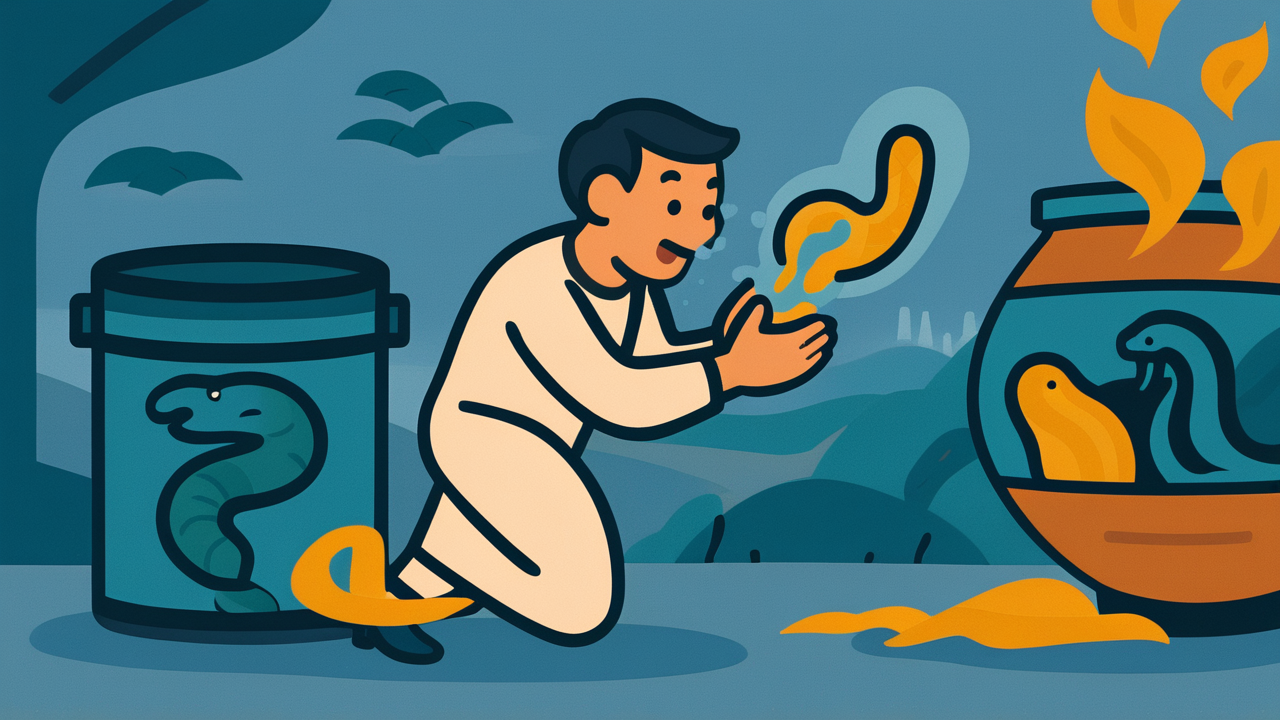How to Read “灰吹きから蛇が出る”
Haifuki kara hebi ga deru
Meaning of “灰吹きから蛇が出る”
“From ash blower snake comes out” is a proverb that expresses how small matters or trivial causes can lead to results or surprising situations that far exceed expectations.
Using the physically impossible situation of a snake much larger than a palm-sized small ash blower emerging from it as an example, this expression describes situations where the scale of cause and effect are completely disproportionate. This proverb is used in situations where unexpected major incidents occur from trivial triggers, or where small actions have unexpectedly large impacts.
It is used in both positive and negative contexts, referring to situations where small acts of kindness bring great fortune, or where slight carelessness causes serious problems. Even in modern times, it can be used as an expression of surprise and unexpectedness when trivial events take unexpected turns. It also contains lessons about life’s unpredictability and the importance of not underestimating small things.
Origin and Etymology
The origin of “From ash blower snake comes out” is related to the “haifuki” (ash blower), a household tool from the Edo period. The ash blower was an ashtray-like tool used when smoking tobacco, made from bamboo tubes or pottery, filled with ash to extinguish tobacco fires or collect ash.
This proverb arose from the physical impossibility of a large creature like a snake emerging from such a small everyday item as the ash blower. The ash blower was a small container that fit in the palm of one’s hand, making it utterly inconceivable for a snake to emerge from it.
For people of the Edo period, the ash blower was a familiar household item, so everyone could understand its smallness from personal experience. The idea of a snake emerging from it must have resonated with people as a prime example of something “impossible.”
The background to this proverb’s establishment lies in the spread of tobacco culture during the Edo period. Because tobacco became widespread among common people and ash blowers became common tools, it could function as a metaphor that many people could relate to. It has been cherished as an exquisite analogy using familiar tools to express surprise that defies physical common sense and unexpected events.
Usage Examples
- That small mistake turned into a major commotion like “From ash blower snake comes out”
- What was meant to be just a small act of kindness developed into a wonderful encounter, truly like “From ash blower snake comes out”
Modern Interpretation
In modern society, the phenomenon of “From ash blower snake comes out” may have become rather commonplace. In the age of social media, a casual post can spread instantly and generate unexpectedly large responses. The way an individual’s small tweet becomes a social phenomenon, or a company’s minor mistake develops into a firestorm controversy, is exactly the situation this proverb expresses.
With technological advancement, the “butterfly effect” where small causes produce large results has become more pronounced. Examples are endless of small bugs in programs causing large-scale system failures, or small ideas from startup companies growing into huge businesses.
In our globalized modern world, small events occurring on the other side of the earth can instantly affect the entire world. It’s not uncommon for one researcher’s discovery to transform medicine, or for an individual investor’s actions to move entire markets.
This proverb also functions as a warning for modern people that “small things should not be underestimated.” At the same time, it gives us hope for the possibility that trivial good deeds might bring unexpectedly great results.
When AI Hears This
The “haifuki fraud” of the Edo period shares remarkably similar psychological mechanisms with modern financial scams. Haifuki was an advanced silver refining technique that remained incomprehensible to ordinary citizens—a highly specialized domain. Fraudsters cleverly exploited this “information asymmetry,” using fake haifuki technology to deceive victims with promises that “massive amounts of silver could be extracted.”
From the perspective of psychology’s “obedience to authority” theory, victims unconditionally trust those who appear to possess specialized knowledge. This is exactly the same tactic used in modern phone scams where criminals impersonate “police officers,” or in cryptocurrency fraud where they bombard victims with complex technical jargon.
What’s particularly fascinating is how the Edo period’s financial system resembled our modern one. Credit creation by money changers, promissory note transactions, investment booms—complex financial instruments already existed. Fraudsters used this complexity as camouflage, marketing haifuki operations as “exclusive investment opportunities.”
From a cognitive science standpoint, humans experience “cognitive overload” when faced with incomprehensible specialized fields, causing them to shut down their critical thinking. Modern investment scams exploit this same psychology by touting complex algorithmic trading or AI investment systems. After 400 years, humanity’s weakness for “blind faith in expertise” remains unchanged, and fraudsters continue to exploit this universal psychological vulnerability.
Lessons for Today
What this proverb teaches us today is that life’s possibilities extend beyond our predictions. There’s no need to fear taking small steps. Your trivial actions might produce unexpectedly wonderful results.
At the same time, it teaches us the importance of being attentive to small things. A little consideration or care might greatly change someone’s life. Conversely, the complacency of thinking “this much should be fine” might invite unexpected problems.
In modern society, the power of information and ideas can have great influence beyond physical constraints. Your small ideas and actions have the power to move many people’s hearts and change society. A casual post on social media might save someone, or a small act of kindness might create unexpected connections.
Therefore, please cherish your daily small choices. Today’s small decisions might become the seeds of tomorrow’s great changes. Life is interesting and full of hope precisely because it is unpredictable.



Comments